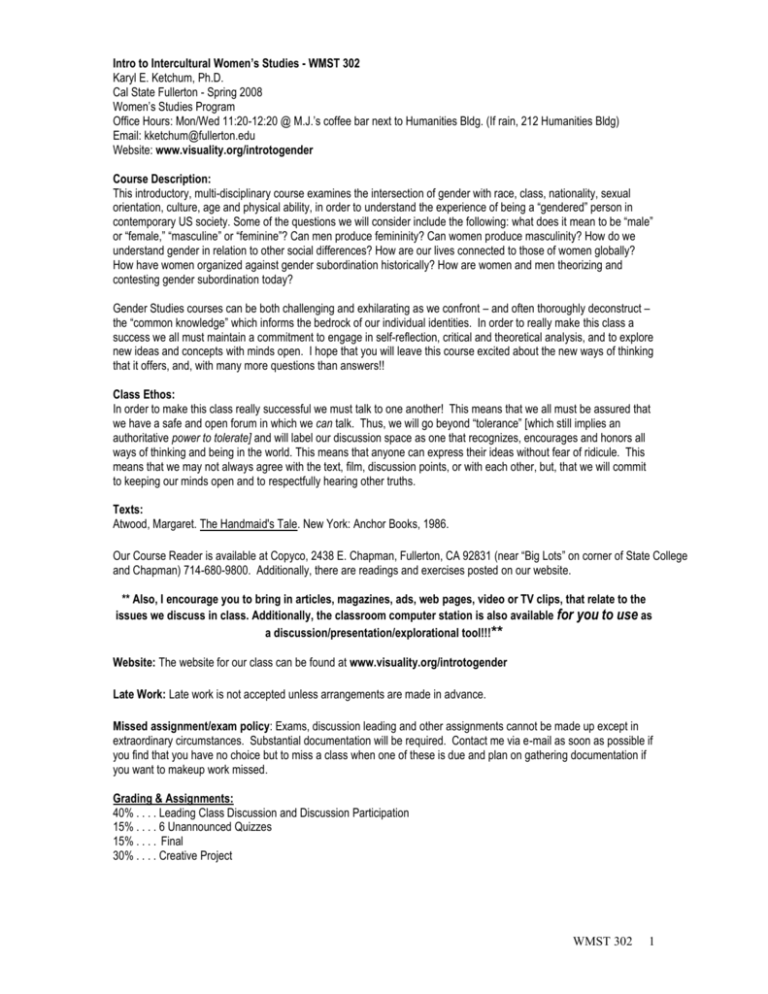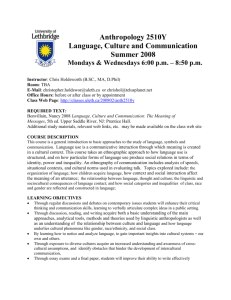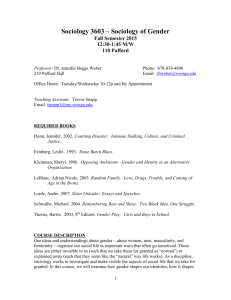Gender and Globalization
advertisement

Intro to Intercultural Women’s Studies - WMST 302 Karyl E. Ketchum, Ph.D. Cal State Fullerton - Spring 2008 Women’s Studies Program Office Hours: Mon/Wed 11:20-12:20 @ M.J.’s coffee bar next to Humanities Bldg. (If rain, 212 Humanities Bldg) Email: kketchum@fullerton.edu Website: www.visuality.org/introtogender Course Description: This introductory, multi-disciplinary course examines the intersection of gender with race, class, nationality, sexual orientation, culture, age and physical ability, in order to understand the experience of being a “gendered” person in contemporary US society. Some of the questions we will consider include the following: what does it mean to be “male” or “female,” “masculine” or “feminine”? Can men produce femininity? Can women produce masculinity? How do we understand gender in relation to other social differences? How are our lives connected to those of women globally? How have women organized against gender subordination historically? How are women and men theorizing and contesting gender subordination today? Gender Studies courses can be both challenging and exhilarating as we confront – and often thoroughly deconstruct – the “common knowledge” which informs the bedrock of our individual identities. In order to really make this class a success we all must maintain a commitment to engage in self-reflection, critical and theoretical analysis, and to explore new ideas and concepts with minds open. I hope that you will leave this course excited about the new ways of thinking that it offers, and, with many more questions than answers!! Class Ethos: In order to make this class really successful we must talk to one another! This means that we all must be assured that we have a safe and open forum in which we can talk. Thus, we will go beyond “tolerance” [which still implies an authoritative power to tolerate] and will label our discussion space as one that recognizes, encourages and honors all ways of thinking and being in the world. This means that anyone can express their ideas without fear of ridicule. This means that we may not always agree with the text, film, discussion points, or with each other, but, that we will commit to keeping our minds open and to respectfully hearing other truths. Texts: Atwood, Margaret. The Handmaid's Tale. New York: Anchor Books, 1986. Our Course Reader is available at Copyco, 2438 E. Chapman, Fullerton, CA 92831 (near “Big Lots” on corner of State College and Chapman) 714-680-9800. Additionally, there are readings and exercises posted on our website. ** Also, I encourage you to bring in articles, magazines, ads, web pages, video or TV clips, that relate to the issues we discuss in class. Additionally, the classroom computer station is also available for you to use as a discussion/presentation/explorational tool!!!** Website: The website for our class can be found at www.visuality.org/introtogender Late Work: Late work is not accepted unless arrangements are made in advance. Missed assignment/exam policy: Exams, discussion leading and other assignments cannot be made up except in extraordinary circumstances. Substantial documentation will be required. Contact me via e-mail as soon as possible if you find that you have no choice but to miss a class when one of these is due and plan on gathering documentation if you want to makeup work missed. Grading & Assignments: 40% . . . . Leading Class Discussion and Discussion Participation 15% . . . . 6 Unannounced Quizzes 15% . . . . Final 30% . . . . Creative Project WMST 302 1 Leading Class Discussion and contributing to Weekly Discussions [includes mini research projects] (40%) – Because this class is necessarily a collaboration among all of us, this component of the class is critical and singly weighs the heaviest in your final class grade. You absolutely must come to class having read, and thought about, the material for that day’s discussion. I will be passing around a sign-up sheet for leading discussions at our second class meeting. There are many ways you can prepare for leading a discussion. These include bringing more information for discussion on one of the authors or any of the ideas presented; creating an informal “quiz” or game which can also be used as a discussion tool; splitting up the class into smaller groups for an activity and then bring class back together for discussion; bring in a relevant speaker or film an interview with a speaker; share a web site or Utube video. Just about anything which helps you to connect to the material for that class is also going to be helpful to your classmates and will work well to get us all thinking about the topic. Have fun with this . . . really anything goes! The participation portion of your grade will be determined by your contribution to the group in class activities and discussions. This includes your attendance, level of preparedness and participation in class discussions. Participation does not mean you should just talk a lot. In order to be a good "class participant" you should: ask questions of the instructor, your classmates, and yourself; contribute insights about the course material and your classmates' comments; and work to create an environment in which everyone is comfortable contributing. This means saying "I don't get it" when you don't, explaining concepts when you think you do "get it," asking questions, making space and time for your classmates' comments, bringing up examples, theorizing, challenging, and analyzing. I expect you to contribute your own ideas and arguments to all our discussions and to be willing to take the risks such contributions imply. 6 Unannounced Quizzes (15%) and Final Exam (15%): Each of these will be in short-answer format. Please bring a Blue Book for your Final Exam. The Final exam will be cumulative and will be held on our last day of class (not during our university-scheduled final exam time) thus reserving our final exam time for any remaining Creative Project Presentations. Creative Project (30%): During the final weeks of class each of you is required to present to the group a creative project on the theme of “living in a gendered body.” Toward this end, you may use whatever medium you like: prose, poetry, paint, sculpture, video, performance, Myspace whatever! You may approach this assignment with a partner, in a group, or as an individual. Be courageous; get really creative! Your project will be graded on creativity, originality of thought, and your ability to engage with the ideas and theories we will be exploring throughout the semester. I will discuss this assignment with your more in class and am also available to meet with you outside of class to brainstorm ideas. *Note: It has been my experience that students often use collage or Powerpoint as a kind of “easy way out” of this type of assignment. Please do not use either of these unless you can really push them into something different and creative! Academic Integrity: You must cite the work of others to preserve intellectual integrity and avoid plagiarism. I encourage you to provide help and resources to each other, but the final product should be your own. If you wish to acknowledge significant ideas contributed to your journal entry or project by a class member, you may cite that person. You can find more information on this at:http://www.fullerton.edu/deanofstudents/Judicial_Affairs/Plagiarism.htm. Technology: I am a big fan of technology and am very happy to have laptops connected to the Internet during class time. Through your internet connection you are welcomed to look up topics as we are discussing them –sharing with the group what you are finding of course - and to take notes on classroom discussions. Please do not use your laptops for activities unrelated to our class discussion or to “hide out” from participating in class. I will ask you to put your laptop away if I become concerned that either of these things might be happening. In-Class Videos and Films: videos and films shown in class will not be placed on reserve. This means that - unless the video is available at a video rental store - you will not be able to makeup this material in the case of absence. This course fulfills the III.C.2 General Education requirement and the following Cultural Diversity goals: GE Learning Goals III.C.2 To understand broad, unifying themes in the social sciences from cross-disciplinary perspectives. To solve complex problems that require social scientific reasoning. To relate the social sciences to significant social problems or to other related disciplines. WMST 302 2 When deemed appropriate, to apply disciplinary concepts from the social sciences in a variety of settings, such as community-based learning sites and activities. Cultural Diversity Goals To understand that culture is socially constructed and fundamental to social interaction. To appreciate the complex relationships that gender, ethnicity and class bring to a discussion of society and culture. To understand that because we live in an inter-connected world, we need to understand the diversity and relationships within and among cultures. To recognize and evaluate how one's cultural history affects one's sense of self and relationship to others. NOTE: This syllabus will change, adapt and evolve based on group interests and time constraints!!! Wed 1/23 Welcome! review syllabus and ask questions Mon 1/28 Introductions What is “Feminist Pedagogy??” Ways we can use technology as part of our class? READINGS DUE: In Reader: 1. Rich, Adrienne. “Claiming and Education,” in Kesselman, Amy, Lily D. McNair and Nancy Schniedewind, ed. Women, Images and Reality. New York: McGraw Hill, 2008. 2. Lorde, Audre. "The Master's Tools Will Never Dismantle the Master's House." From This Bridge Called My Back. Ed. Cherie Moraga and Gloria Anzaldùa. Latham: Women of Color Press, 1983. 98-101. On Website: Marilyn Frye, "Oppression" Wed 1/30 The Social and Cultural Construction of the Body and Biological Sex READINGS DUE: In Reader: 3.Fausto-Sterling, Anne. “Sexing the Body.” New York: Basic Books, 2000. Chap 3, “Of Gender and Genitals” pg 45-77. Film: “Is it a Boy or a Girl?” [60 min.] Mon 2/4 The Social and Cultural Construction of the Body and Biological Sex [continued] Guest Speaker: Marlene Hilborn READINGS DUE: Online: “Marina’s Gift” Wed 2/6 Constructing Masculinities [plural!] Film: Tough Guise [57 min.] READINGS DUE: On Website: “Show Me Yours” Mon 2/11 Women and Violence POPCORN DAY!!! - Film: “V Day” [73 min.] WMST 302 3 Wed 2/13 Women and Violence Film: “V Day” READINGS DUE: In Reader: 4. Caroline Bridges, Grace. “Lisa’s Ritual, Age 10,” in Okazawa-Rey, Gwyn Kirk and Margo, ed. Women's Lives Multicultural Perspectives. Fourth ed. Boston: McGraw Hill, 2007. 5. Stoltenberg, John. “I am Not a Rapist,” in Okazawa-Rey, Gwyn Kirk and Margo, ed. Women's Lives Multicultural Perspectives. Fourth ed. Boston: McGraw Hill, 2007. Mini Online Research Project: Search the Internet to answer these questions: who was Gwen Araujo? What happened to her? How? Why? By whom? Print out what you find and be prepared to offer a gendered analysis of it in class. Discussion: Mr. Jones and Rape Myths Mon 2/18 Presidents’ Day – no class Wed 2/20 Understanding Sexualities and Desires READINGS DUE: In Reader: 6. Feinberg, Leslie “We Are All Works in Progress,” in Okazawa-Rey, Gwyn Kirk and Margo, ed. Women's Lives Multicultural Perspectives. Fourth ed. Boston: McGraw Hill, 2007. On Class Website: Koedt: “The Myth of the Vaginal Orgasm” Mon 2/25 The Social Fiction of Race (including whiteness!) READINGS DUE: In Reader: 7. Haney Lopez, Ian “The Social Construction of Race,” An Introduction to Women's Studies – 1st Edition. Ed. Inderpal Grewal and Caren Kaplan. New York: McGraw Hill, 2002. 8. McIntosh, Peggy. “White Privilege: Unpacking the Invisible Knapsack” in Kesselman, Amy, Lily D. McNair and Nancy Schniedewind, ed. Women, Images and Reality. New York: McGraw Hill, 2008. 9. Mirikitani, Janice. “Salad” in Kesselman, Amy, Lily D. McNair and Nancy Schniedewind, ed. Women, Images and Reality. New York: McGraw Hill, 2008. 10. Chrystos. “I Am Not Your Princess” in Kesselman, Amy, Lily D. McNair and Nancy Schniedewind, ed. Women, Images and Reality. New York: McGraw Hill, 2008. 11. Castro, Carrie. “Take a Closer Look” in Kesselman, Amy, Lily D. McNair and Nancy Schniedewind, ed. Women, Images and Reality. New York: McGraw Hill, 2008. Film: Illusions [34 min.] Wed 2/27 The Social Fiction of Race (including whiteness!) [continued] READINGS DUE: In Reader: 12. Hammonds, Evelynn M., "New Technologies of Race." An Introduction to Women's Studies – 2nd Edition. Ed. Inderpal Grewal and Caren Kaplan. New York: McGraw Hill, 2006. CONTINUED WMST 302 4 13. Gonzalez, Vernadette V. and Robyn Magalit Rodriguez, “Filipina.com” in Grewal, Inderpal and Caren Kaplan. An Introduction to Women's Studies – 2nd Edition. 2006. Mini Online Research Project: Do a survey of Internet sites which offer women for dating and marriage. What nations are these women from? What kinds of adjectives (read stereotypes) are used to “sell” these women? Think through a gendered analysis of these sites and be prepared to share your thoughts in class. Mon 3/3 The “Self” and the “Other” READINGS DUE: Online Exercise: The Global Politics of Veiling Film: Veiling and Seclusion: Women of the Muslim World [50 min.] Wed 3/5 The “Self” and the “Other” [continued] READINGS DUE: In Reader: 14. Collins, Catherin A. Lutz and Jane L. excerpts from “Reading National Geographic." in An Introduction to Women's Studies – 1st Edition. Ed. Inderpal Grewal and Caren Kaplan. New York: McGraw Hill, 2002. 15. goset, hattie. “is it true what they say about colored pussy.” in Vance, Carole S., ed. Pleasure and Danger: Exploring Female Sexuality. London: Pandora Press, 1989. On Class Website: “The Hottentot Venus is Going Home” Discussion: “The Recipe for “Othering” Mon 3/10 Day to Catch Up! Wed 3/12 Representation and the “Real” READINGS DUE: In Reader: 16. Lakoff, Robin. "Talking Like a Lady" The Routledge Language and Cultural Theory Reader. Ed. Tony Crowly and Alan Girvin Lucy Burke. The Politics of Language. London: Routledge, 1980. 17. Berger, John. Excerpts from “Ways of Seeing,” in An Introduction to Women's Studies – 1st Edition. Ed. Inderpal Grewal and Caren Kaplan. New York: McGraw Hill, 2002. Discuss: Goffman’s Gender Advertisements ***bring in magazines for in-class exercise*** Mon 3/17 Representation and the “Real” [continued] POPCORN DAY!!! Film: Bell Hook’s “Cultural Criticism and Transformation” [70 min.] Wed 3/19 Reproductive Rights and Wrongs READINGS DUE: In Reader: 18. Males, Mike “Parental Consent Laws: Are They a `Reasonable Compromise’” in Kesselman, Amy, Lily D. McNair and Nancy Schniedewind, ed. Women, Images and Reality. New York: McGraw Hill, 2008. CONTINUED WMST 302 5 19. Davis, Angela, “Reproductive Rights” in An Introduction to Women's Studies – 1st Edition. Ed. Inderpal Grewal and Caren Kaplan. New York: McGraw Hill, 2002. Mon 3/24 SPECIAL CLASS!! As a class we will be attending the Women's Studies Program’s "Scholarship on Gender" conference on Monday, March 24, 2008 in the Titan Student Union, as part of the Women's History Month events on campus – should be fun!!! EXTRA CREDIT [graded + or-]: Write a one-page analysis of this event relating it to our course materials. Wed 3/26 Gender, Creativity and the Cannon READINGS DUE: In Reader: 20. Gilbert, Sandra and Susan Gubar, excerpt from The Mad Woman in the Attic. In Jackson, Stevi, ed. Women's Studies Essential Readings. New York: New York University Press, 1993. On Website: New Yorker Magazine Nov, 2007 “Where Are All the Women?” AND Nochlin, Linda “Why Have There Been No Great Women Artists?” Discuss: “What ever happened to the 70’s Feminist Art Movement?” Mon 3/31 Spring Recess 3/31 Cesar Chavez Day – no class meeting Wed 4/2 Mon 4/7 4/2 Spring Recess – no class meeting Gender, Creativity and the Cannon [continued from 3/26] In-Class Workshop on Women Writers – YEEEHAAAA!!! READINGS DUE: In Reader: 21. Hong Kingston, Maxine, Author Biography & “No Name Woman” in Gilbert, Sandra and Susan Gubar, ed. The Norton Anthology of Literature by Women. New York: Norton & Co., 1985. 22. Carol Oates, Joyce, Author Biography & “Where Are You Going Where Have You Been?” in Gilbert, Sandra and Susan Gubar, ed. The Norton Anthology of Literature by Women. New York: Norton & Co., 1985. 23. Virginia Wolfe, Author Biography & “22 Hyde Park Gate” in Gilbert, Sandra and Susan Gubar, ed. The Norton Anthology of Literature by Women. New York: Norton & Co., 1985. Wed 4/9 Living in a Global Economy READINGS DUE: On Class Website: Fregoso, Rosa Linda. "Voices without Echo: The Global Gendered Apartheid." Emergences 10.1 (2000): 137-55. Film: Senorita Extraviada [60 min.] Mini Online Research Project: Does the femicide in Juarez continue? Print out what you find and bring to class for discussion. Mon 4/14 Wed Day to Catch up!!! Or, debate on pornography? Or, discuss S.C.U.M. Manifesto? Or, “Popcorn Day”? Discuss Atwood’s novel WMST 302 6 4/16 READINGS DUE: Atwood, Margaret. “The Handmaid’s Tale” Mon 4/21 Wed 4/23 Mon 4/28 Wed 4/30 Mon 4/5 Wed 5/7 Creative Project Presentations – attendance mandatory! Creative Project Presentations – attendance mandatory! Creative Project Presentations – attendance mandatory! Creative Project Presentations – attendance mandatory! Creative Project Presentations – attendance mandatory! Final Exam Review (time willing) Final Exam WMST 302 7







